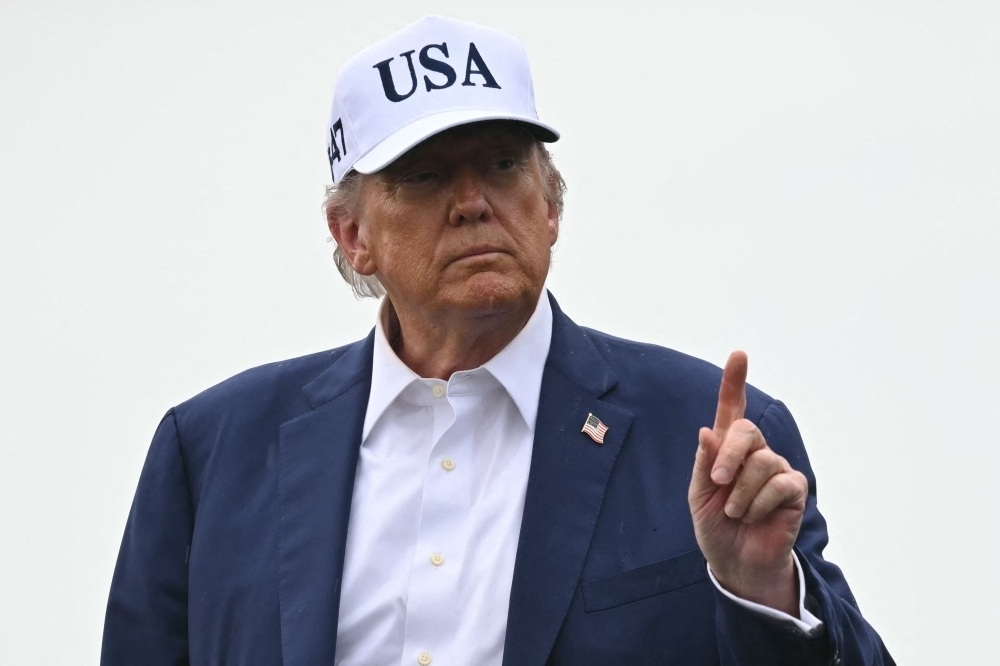In a bold escalation of his administration’s protectionist trade agenda, U.S. President Donald Trump on Monday, July 7, 2025, announced steep new tariffs on imports from 14 countries, including close allies like Japan and South Korea.
According to online media sources, the move, unveiled Monday, marks a dramatic effort to pressure foreign governments into boosting U.S. exports and relocating manufacturing to American soil.
Effective August 1, the targeted countries will face tariffs ranging from 25% to 40%, up from the previous flat rate of 10%.
The highest tariffs – 40% – are set to apply to Laos and Myanmar, while others like Japan, South Korea, Malaysia, and Kazakhstan will see a 25% rate.
Cambodia and Thailand face 36%, Serbia and Bangladesh 35%, and Indonesia 32%.
South Africa and Bosnia and Herzegovina are slated for a 30% hike.
In nearly identical letters sent to the leaders of the affected nations, Trump warned that only “balanced and fair TRADE” would define future relationships with the U.S., using capitalized words to emphasize his message.
While Trump threatened retaliatory tariffs for any backlash, he left room for negotiation, stating that relief could be granted if countries opened their markets and reduced trade barriers.
“If you wish to open your heretofore closed Trading Markets to the United States, eliminate your tariff, and Non Tariff, Policies and Trade Barriers, we will, perhaps consider an adjustment to this letter,” the letters read.
Trump added that the tariffs “may be modified, upward or downward, depending on our relationship with your Country.”
Speaking later to reporters, Trump described the August 1 deadline as “firm,” but added that it wasn’t set in stone.
“If they call up and they say we’d like to do something a different way, we’re going to be open to that,” he said.
Reactions from the targeted nations were swift but measured.
Japanese Prime Minister Shigeru Ishiba called the decision “truly regrettable” but affirmed Tokyo’s commitment to ongoing negotiations.
South Korea’s Ministry of Trade said it would accelerate talks to resolve uncertainties created by the tariff announcement.
Malaysia’s trade ministry similarly stressed its commitment to working toward a “balanced and comprehensive” agreement.
Experts say Asian countries, many of whom depend heavily on exports, are under serious pressure to comply.
Lawrence Loh, director at the Centre for Governance and Sustainability at the National University of Singapore, noted that the varied interests of these countries make coordinated resistance unlikely.
“Even ASEAN, as a bloc, is not positioned to act collectively in this case,” Loh said.
“That’s the trump card for Trump.”
Smaller economies, in particular, may have little room to maneuver.
Loh cautioned that refusing to negotiate could cause greater economic harm than conceding to Washington’s demands.
“Retaliation is out of the question for these smaller players,” he said.
Markets responded in mixed fashion.
While U.S. stocks dipped in response to the increased trade tension, the S&P 500 dropped 0.8%, and the Nasdaq Composite slid 0.9%—major Asian markets remained resilient.
South Korea’s KOSPI gained 1.4%, Hong Kong’s Hang Seng Index rose 0.8%, and Japan’s Nikkei 225 saw a modest 0.2% increase.
Meanwhile, only three nations – China, Vietnam, and the United Kingdom, have so far reached preliminary deals with the Trump administration to ease trade tensions.
U.S. Treasury Secretary Scott Bessent hinted on Monday that “several” more agreements could be announced within the next 48 hours, though he declined to name the countries involved.
White House Press Secretary Karoline Leavitt confirmed that more letters would be sent to other trade partners in the coming days, and that deals with additional nations were “close.”
Calvin Cheng, a trade policy expert at the Institute of Strategic and International Studies in Kuala Lumpur, said countries are likely to deploy a mix of policy tools.
According to him, this is aimed at meeting U.S. expectations, particularly around issues like intellectual property protections and rules of origin.
However, he warned that many governments may also begin preparing their industries for a new reality in which higher tariffs are here to stay.
“I believe much of this tariff regime will prove more durable than initially thought,” Cheng said.
Eduardo Araral of the Lee Kuan Yew School of Public Policy echoed that view.
He added that unless U.S. allies can offer wide-ranging concessions, particularly in sectors like agriculture, autos, and digital trade, Trump’s tariff pressure is unlikely to ease before the August deadline.



